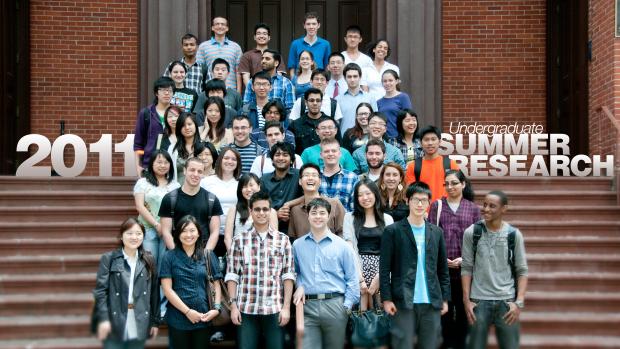Undergraduate Summer Research Program Kicks Off

While some students have hung up their lab coats for the summer, others will just be putting theirs on. Starting June 13, students from the Polytechnic Institute of NYU, NYU’s College of Arts and Science, and NYU-Abu Dhabi who were selected for the Undergraduate Summer Research Program will crowd NYU-Poly’s labs to begin the 10-week program. Besides conducting lab work, they’ll hear presentations from faculty, give their own to peers and mentors, and learn about a variety of topics, such as patents and advancing on to graduate programs.
Rising junior Andrew Karas, who will receive a degree from NYU-Poly’s Department of Chemical and Biological Engineering in 2013, found the program so beneficial when he participated last year that he successfully reapplied and will be involved again this summer. “Other students should do it because it’s a really good experience,” he says. “You actually get paid instead of doing it on a voluntary basis.”
More than Money
Karas points to other advantages. “It’s a good way to get to know professors and to learn new things that are outside the curriculum,” he says, praising, in particular, the influence of Dr. Myles Jackson, who teaches in NYU-Poly’s Department of Humanities and Social Sciences and who Karas worked with in 2010. “I definitely found myself trying harder in everything because of spending time with him.”
The faculty mentors who join in the program express equal satisfaction. “It’s rewarding to work with undergrads and help them accomplish something and nurture their interest in science and research,” says Maurizio Porfiri, NYU-Poly associate professor in the Department of Mechanical and Aerospace Engineering. A participant for the fifth consecutive year of the program’s history, Professor Porfiri firmly believes in its merits not only for undergraduates, but for the other students who work alongside them. For instance, his lab involves high school and graduate students, and “undergrad students serve as a liaison,” he says, “making a very nice, heterogeneous team that’s motivated to address research challenges.” Professor Porfiri also cites the outreach experience undergraduates who work with him gain, since the researchers in his lab teach a summer class on underwater robotics at the New York Aquarium.
Not all of the other faculty mentors involved in the Undergraduate Summer Research Program have an outreach component for students to tap into, as each faculty member presides over a specialized project, such as brute force network attacks, finding new ways to reduce dependence on petroleum, or engineering tissue scaffolds for cartilage, that offers its own unique lessons.
Down and Dirty
All the research efforts do share one characteristic, however: conferring heavy-duty responsibility. “This is not an elementary research experience,” says Holly Halmo, Assistant to the Dean of Undergraduate Academics, whose office coordinates the program’s activities. “This is getting your hands dirty. This is running the experiments, staying in the lab until everything’s done. There’s a lot of autonomy in it for students.”
“They’re not called research assistants,” she emphasizes. “They’re called researchers.”
That kind of rigor can lead to what may be the most plum result for an undergraduate: getting a paper published in a peer-reviewed journal. Indeed, past participants have enjoyed precisely that success — in 2010 Raaj Rajmangal, along with his research adviser, Dr. Stephen Arnold of the Department of Applied Physics, had a paper published in the Review of Scientific Instruments.The effort has already yielded citations for the duo.
Professor Porfiri likens the experience to a sneak preview of graduate school. Students “get to know what it means to do research, what it means to be in a lab, what it means to teach,” he says.
The Undergraduate Summer Research Program can also clarify next steps not just for life in the post-undergraduate years, but during. The program can be “a way to decide if a major is for them,” says Halmo. “For most students, it solidifies their choice. For some, they go, ‘Wow. This is not for me. I enjoyed this, but it’s not what I want to do.’ It’s a good litmus test.”




